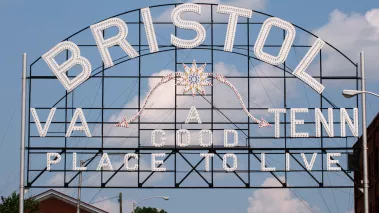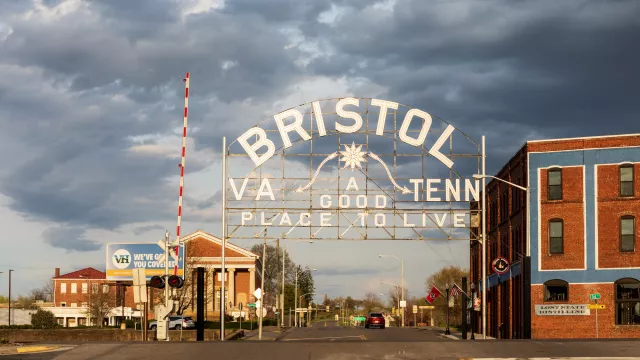Table of Contents
FIRE and NCAC’s letter prompts Tennessee city to revise unconstitutional social media policy

Cindy Goff / Shutterstock.com
Following a letter from FIRE and the National Coalition Against Censorship, the city of Bristol, Tennessee, has revised a policy that unconstitutionally restricted comments on the city’s social media pages based on viewpoint. The new policy isn’t perfect, but it’s a big step in the right direction.
FIRE and NCAC wrote Bristol’s city council in April explaining that its original policy violated the First Amendment by banning:
- “Personal attacks”
- “Disparaging comments of any kind”
- “Offensive comments that target or disparage any ethnic, racial, or religious group”
- Comments that “[a]dvocate illegal activity”
- Comments that “[c]ontain any information or statements that would negatively affect the city’s image”
On May 5, Bristol City Attorney Danielle Smith notified FIRE and NCAC that the city was revising the policy to bring it into compliance with the First Amendment.
FIRE and NCAC have not heard from Bristol since then. But we discovered earlier this month that the city posted a revised policy on its website, removing all of the viewpoint-discriminatory restrictions to which we objected.
FIRE has seen local governments abuse similar restrictions to suppress protected speech during the public comment periods of city council or school board meetings.
That’s a win for Bristol residents and others who wish to comment online on issues related to the city.
When Bristol opened its social media pages to public comment and encouraged visitors to submit “questions, comments, and concerns,” it opened a public forum where First Amendment standards apply. (For more on this, check out FIRE’s report, “No Comment: Public Universities’ Social Media Use and the First Amendment.”) That means city officials may not censor comments simply because they express a viewpoint those officials dislike, such as those they find “offensive” or “disparaging.”
As our letter noted, “It is all too easy to envision the city using the policy to suppress criticism of government officials and to sweep any complaints related to the city or its administration under the rug.” Fortunately, the revised policy largely resolves this concern.

Bristol, Tennessee bans comments on its social media pages that would ‘negatively affect the city’s image’
News
FIRE and NCAC wrote Bristol explaining that its viewpoint-discriminatory policy violates the First Amendment
But while the revisions eliminate the most egregious, viewpoint-discriminatory restrictions of the prior policy, the new policy still leaves some room for improvement. Three current provisions in particular stand out, restricting:
- “Personal information of individuals, such as addresses, phone numbers, or email addresses or other information made private by state or Federal law”
- “[I]ndecent material”
- “Encouragement of immediate illegal activity or violence”
FIRE and NCAC sent Bristol a second letter last week recommending some tweaks needed to avoid these restrictions being unconstitutionally vague or overbroad.
For instance, the sweep of the term “personal information” is unclear — would it, for instance, include city officials or employees’ work addresses and phone numbers? Notably, the policy separately bans threats, stalking, and harassment, so the city could still remove posts that reveal “personal information” when shared in the context of a true threat or as part of an unlawful course of conduct. We recommended Bristol revise the first provision to simply ban posting “information made private by state or Federal law.”
Bristol should also delete the vague ban on “indecent material.” Though it comes alongside bans on nudity, pornography, and obscene content, it requires clarification to avoid users interpreting it as reaching even non-sexual content some find offensive or profane but that concerns issues related to the city. FIRE has seen local governments abuse similar restrictions to suppress protected speech during the public comment periods of city council or school board meetings. For instance, the Brevard County School Board in Florida ejected a commenter for using language like “penis” when criticizing the school’s response to an incident in which a teacher showed photos of his genitalia to students.
We commend Bristol for taking its First Amendment obligations seriously and hope it will continue improving its policies to ensure they pass constitutional muster.
Finally, the ban on “[e]ncouragement of immediate illegal activity or violence” improves on the previous ban on comments that “[a]dvocate illegal activity.” As our initial letter explained, “While the First Amendment does not protect speech that advocates and is likely to result in immediate illegal activity, mere abstract advocacy of unlawful conduct is fully protected.”
The new provision approaches the constitutional standard for unprotected incitement, but it doesn’t quite get there because it doesn’t require the speech to be likely to result in imminent unlawful action. So we recommended Bristol adopt the following language to bring this provision in line with the constitutional standard: “Comments that are intended to and likely to result in immediate illegal activity or violence.”
Despite these shortcomings, the new policy is substantially improved and the most egregious, viewpoint-discriminatory restrictions are gone. We commend Bristol for taking its First Amendment obligations seriously and hope it will continue improving its policies to ensure they pass constitutional muster.
Recent Articles
FIRE’s award-winning Newsdesk covers the free speech news you need to stay informed.

O holy fight: New Hampshire Satanic Temple statue threatened by more than vandals

California and other states are rushing to regulate AI. This is what they’re missing

One day after FIRE lawsuit, Congress passes changes to filming permits in national parks


